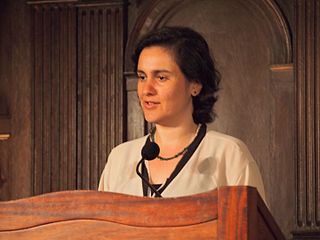A Quote by Kamila Shamsie
No self-respecting feminist could argue with the claim that the novel is more likely to accept existing power structures than not. But there's a vast difference, surely, between Dickens saying Indians should be exterminated and a Dave Eggers writing eloquently about the NSA, but not being as outspoken on American military power abroad.
Related Quotes
The Anarchists are right in everything; in the negation of the existing order, and in the assertion that, without authority, there could not be worse violence than that of authority under existing conditions. They are mistaken only in thinking that Anarchy can be instituted by a revolution. "To establish Anarchy." "Anarchy will be instituted." But it will be instituted only by there being more and more people who do not require protection from governmental power, and by there being more and more people who will be ashamed of applying this power.
I would argue, for perspective's sake, that the arc of a really literary work is precisely that it both intensely reflects, and simultaneously transcends the conditions of its making. I would say that is the difference between literature and other kinds of writing. That is what the literary is - it ultimately doesn't matter what his circumstances were. And the thing that you were just saying about being sympathetic to Brontë and the fact that she could only write what she wrote when she wrote it... that's true. But look at that novel, which means so much to so many people.
The question is, how do you stop the power elite from doing as much damage to you as possible? That comes through movements. It's not our job to take power. You could argue that the most powerful political figure in April of 1968 was Martin Luther King. And we know Johnson was terrified of him. We have to accept that all of the true correctives to American democracy came through these movements that never achieved formal political power and yet frightened the political establishment enough to respond.
Our work has only begun. In our time we have an historic opportunity to shape a global balance of power that favors freedom and that will therefore deepen and extend the peace. And I use the word power broadly, because even more important than military and indeed economic power is the power of ideas, the power of compassion, and the power of hope.
If you're writing a book where you want to make a positive truth claim, then you should absolutely call it nonfiction or memoir. If you don't want to make that claim - if that's not what's important to you; if you're more interested in storytelling and interiority and interpersonal relationships than in objective, checkable facts about the world - then why wouldn't you call it a novel, and take advantage of what that gets you, of the extra freedom, of belonging to the tradition of the novel?
The mistakes (of leaders) are amplified by the numbers who follow them without question. Charismatic leaders tend to build up followings, power structures and these power structures tend to be taken over by people who are corruptible. I don't think that the old saw about 'power corrupts and absolute power corrupts absolutely' is accurate: I think power attracts the corruptible.
There is a difficulty about disagreeing with God. He is the source from which all your reasoning power comes: you could not be right and he wrong any more than a stream can rise higher than its own source. When you are arguing against Him you are arguing against the very power that makes you able to argue at all: it is like cutting off the branch you are sitting on.






































